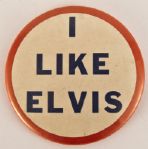I certainly see your point, and I think this was also discussed in the original thread when DJC shared the proposed single artwork.Ryan73 wrote: ↑Wed Dec 23, 2020 1:14 amSorry, I meant 'bunch' in the broader sense that out of the slew of recordings he did, RCA was looking at it for a possible single release as opposed to so many other songs that he had cut during that session. My fault in the generalization. However, I still feel it says a lot that execs, (not Elvis who figured it was mediocre nor Felton who didn't push for a master) felt that this loose jam session would be more suitable for single release than an actual master recording.rockinrebel wrote: ↑Wed Dec 23, 2020 1:04 amWhilst there were some questionable single choices from the June / September 1970 recordings, I don't think Mojo was ever considered the best of the bunch.Ryan73 wrote: ↑Tue Dec 22, 2020 11:14 pmExcellent post. Elvis had the 'goods' but his finest work was most often produced when he had someone to guide him and he benefitted greatly from collaborative efforts. Without that collaborative effort, Elvis was limited to whatever songs were kicking around in his head which was usually gospel or country. It is a shame that he viewed Mojo as medicore....heck as the Doc pointed out even RCA was considering it as the best of the bunch and was considered for single release, despite it being just a jam session that happened to be caught on tape. That says a lot.r&b wrote: ↑Tue Dec 22, 2020 10:56 pmSeriously Felton's approach sucked. He was simply a yes man and guy in place to keep things as peaceful and upbeat as possible. Words from Lacker himself. Think about it, we actually are thanking a producer for keeping a tape machine rolling to capture studio moments, Great, but big deal. His job as producer should have been to inspire these moments into full blown masters, and as you say get lyrics sheets, encourage genre type albums after 1970 especially since Elvis Country was so well received. I think if anyone needed a good producer with a vision after 1970 it was Elvis. Felton was imply not in the class of other 70's producers, who probably would have given anything for that chance. Elvis had no vision either as recording artist, so all the blame cant go to Felton.rockinrebel wrote: ↑Tue Dec 22, 2020 10:46 pmIt's a bit of a paradox really. We know Elvis went for the overall feel, rather than the flawless take (although sometimes he achieved both in one take, with Reconsider Baby being a prime example). But if we look at Faded Love, whilst Elvis did try out a short country version at an earlier point in the session, I don't think what he actually produced with the studio band could have been bettered by going for multiple takes, and the same could probably be said for I Washed My Hands In Muddy Water, and even Whole Lotta Shakin' Goin' On.r&b wrote: ↑Tue Dec 22, 2020 9:46 pmYes and isnt that a sad testament to his 70's catalog, when un-rehearsed jams are among his best work, so at least I thank Felton for that. One of telling things about this new set is Mojo, when at the end Elvis says we grew up on this mediocre sh*t or something like that. Sad, if he only realized the greatness of that simple stuff and that it may have been the best thing recorded that day. Lets move onto 'Life' now!rockinrebel wrote: ↑Tue Dec 22, 2020 9:23 pmI guess we should be grateful to Felton that he did keep the tapes rolling at all times, as I agree that some of the one take jams were amongst Elvis' best later work. The new release also proves that the 'sweeteners' were not really necessary. I never really understood the love for Got My Mojo Working, particularly with the overdubs added, but the new mix on this set really brings the performance to life.Ryan73 wrote: ↑Tue Dec 22, 2020 4:46 pmI'm personally grateful that they had this producer rework all of these nashville recordings. Honestly its been ages since i've ever heard a real improvement in any Elvis mixes that actually made an impression upon me. With that being said, I do think sales wise it would have benefitted by being a singular cd similar to the stax release. As fan though, I'm really impressed with the work he did on the country numbers and I actually wound up liking a few of the ttwii tracks.
One thing that struck me here and on various 70s releases is how some of his best work were the result of Elvis picking something from that songbook in his brain and just jamming. It shouldn't be a surprise I guess because that type of spontaneity lead to That's all right mama. The difference being is that Philps or Moman were able to see the value in that and push for a master take, whereas felton basically just hit record and threw some sweeteners on top.
I'm going off topic a little here, but I have written in the past that when Elvis had both Dylan & The Beatles on his mind during the 1971 sessions, it's disappointing that Felton didn't encourage Elvis to get copies of the lyrics and work out proper arrangements. So, what we are left with are just unfinished glimpses of what might have been.
The one take jams are pure Elvis though, and even with Chips at the helm, whilst the likes of I'll Hold You In My Heart and Stranger In My Own Hometown were not representative of the contemporary hit material that Elvis went to American to record, they are certainly wonderful performances and session highlights.
However, his takes on Mojo or the later Don't Think Twice would certainly have benefitted from further rehearsal and acces to the lyric sheets, but sadly Felton never encouraged this.
As much as I enjoy the June 1970 recordings, I think it was fortunate that the Elvis Country album evolved due to Elvis' dissatisfaction with some of the new material on offer, as this lifted the overall standard of what was eventually recorded.
When Elvis returned to Nashville during 1971, less inspired than he had been the previous year, the alarm bells really should have been ringing though, as any enthusiasm Elvis may have had for a folk themed album doesn't appear to have been encouraged, and the secular material on offer was uneven at best.
So, Felton's approach gave us rough cut diamonds in the piano songs and the jam on Don't Think Twice, but none of these were really commercial enough to build an album around that would have been a worthy follow up to Elvis Country.
It was business as usual from that point onwards though, with the publishing companies providing the majority of the material, and Felton hoping that Elvis was either inspired enough to elevate it, or that he would dip back into that songbook of his old favourites that ultimately provided the highlights to a number of his sessions.
It was actually passed over for two albums, and only appears to have been considered for single release when RCA started compiling the session leftovers for the release of the Love Letters album in the summer of 1971.
So, it might well have been the best performance on the Love Letters album, but certainly not from the entire sessions.
I'd still be interested to know whether a mono single edit of Mojo was ever prepared too, as for me, the track as it appeared on the Love Letters album would have needed a tighter edit for any proposed single release.
My take on this is that there had been too many ballads released as singles since the success of The Wonder Of You, and by this time, with diminishing returns on these singles, and the promotion of the TTWII & Elvis Country albums effectively over, RCA were looking for an uptempo, roots based choice amongst the masters they had left.
Assuming live recordings were off the agenda, the only decent option was Mojo, but some of the single choices from this period of Elvis' career are questionable to say the least.
Elvis' 'mediocre sh*t' comments at the end of the jam may well have been tongue in cheek. We can give him the benefit of the doubt on this one, as Hands Off had also been taped during an earlier informal session, whilst Mojo was reprised during the TTWII rehearsals, so there was definitely some love for the material there.
Elvis' feelings about Life, however, are pretty clear from the session tapes, and yet this song was chosen as a single release before the release of the Love Letters album in May 1971. I can only assume that Elvis no longer chose his own single sides by this stage of his career, but if this was the case, why did it take RCA until the summer of 1971 to realise that something needed to change?
In terms of Elvis' record releases, the comeback momentum was lost very quickly due to some very poor decisions.





